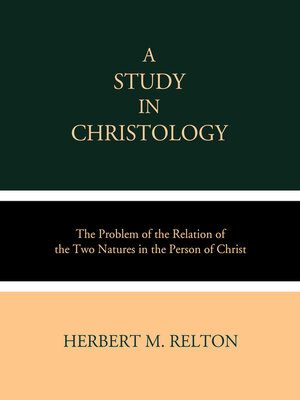A Study in Christology
ebook ∣ The Problem of the Relation of the Two Natures in the Person of Christ
By Herbert M. Relton

Sign up to save your library
With an OverDrive account, you can save your favorite libraries for at-a-glance information about availability. Find out more about OverDrive accounts.
Find this title in Libby, the library reading app by OverDrive.



Search for a digital library with this title
Title found at these libraries:
| Library Name | Distance |
|---|---|
| Loading... |
The thesis divides itself naturally into three parts.
In Part I we review the ancient Christology. Taking Apollinarianism as our starting-point, we trace the course of Christological speculation down to the Chalcedonian Definition, and we endeavour to estimate aright the true value and significance of that formula. We point out its merits and limitations, and we trace its interpretation in the Christology of Cyril and Leo, representing East and West. We then show how the doctrine of the impersonal manhood is the weak point against which attacks were made by those who were unable to accept the Chalcedonian Christology, and who were tempted in either a Nestorian or Monophysite direction.
We then review the theology of Leontius of Byzantium, and endeavour to estimate the precise meaning and significance of his doctrine of the Enhypostasia. We show how this represents the furthest point reached by the ancient Christology in the attempt to fathom the mystery of Christ's Person, and how the importance of the contribution made by Leontius was recognised in its incorporation into the final formulation of Greek theology made by John of Damascus.
In Part II we pass to the second great Christological epoch in which we find ourselves living to-day. We consider carefully the modern revolt against the Chalcedonian Christology, and more particularly the objections raised against the 'Two Natures' hypothesis and the impersonality of Christ's manhood. We indicate the way in which these objections can be met by the doctrine of the Enhypostasia, and we proceed to show how this doctrine is rooted and grounded in the very nature of both man and God. This leads us to a careful examination of human nature in the light of modern psychology, and we attempt to analyse human personality. We further consider the Nature of God as this is revealed to us, and we fix upon Lotze's treatment of Personality, human and Divine, as one of the keys for a modern reinterpretation of the doctrine of the Enhypostasia. We review the relationship between the human and the Divine in us, and incidentally we endeavour to refute conclusively the modern attempt to argue from the analogy of the relation between the human and the Divine in us, to their relation in the Person of Christ. We give reasons for rejecting this analogy as fundamentally unsound, and as the source of much erroneous teaching in Christology to-day.
The true significance of Part II in its relationship to the whole thesis may easily be missed, but those who will study carefully our treatment of dualism, and the analysis of the human and the Divine both in themselves and in their relationship, will be able to appreciate more fully in the light of the results adduced in Part III how we have endeavoured to find the basis of the doctrine of the Enhypostasia in the very constitution of both natures in the Person of Christ.
In Part III we review some recent attempts at Christological reconstruction, and indicate the general drift of speculation. We see the difficulties under which these attempts labour, and we thus pave the way for our reinterpretation of the doctrine of the Enhypostasia, which we put forward as capable of meeting these difficulties so far as they can be met. We draw out at some length the advantages offered by this theory, and we finally appeal to the Gospel narratives for confirmation of our hypothesis. We conclude that whilst no theory will ever succeed in solving the problem of Christ's Person, which baffles all our 'explanations' and transcends the capacities of our intellect, remaining thus as much a 'mystery' for the twentieth-century mind as it was for the first-century mind, yet, amongst the many theories offered to-day for o...







